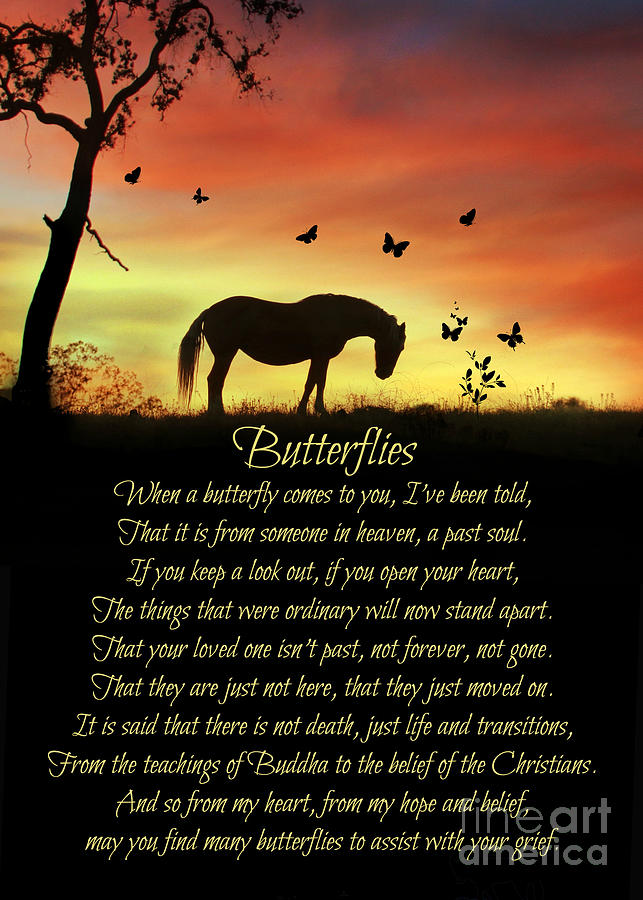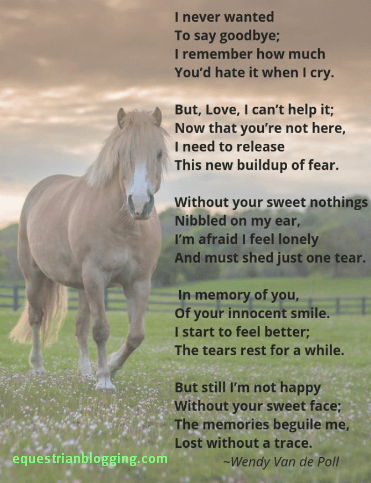The Loss of a Horse Poem in Austin, Texas offers personalized memorial gifts and plaques with uplifting poems to help horse owners cope with the grief of losing their beloved equine companions. These thoughtful gifts, available on platforms like Etsy and Amazon, provide comfort and support during this challenging time.
Additionally, it’s important to show empathy and offer words of condolences to someone who has lost a horse, expressing your heartfelt sympathy and acknowledging the horse’s uniqueness and impact on their life. Proper aftercare for a deceased horse should also be arranged, either through a local service that can transport the body to a rendering plant or crematorium.
Making this difficult decision to euthanize a horse can bring mixed emotions, so offering words of support and reassurance can be meaningful to the owner.

Understanding The Loss
Losing a beloved horse is a heartbreaking experience that can leave us feeling lost, empty, and overwhelmed with grief. Horses hold a special place in our hearts, as they become not just animals, but companions and friends. When they pass away, it is natural to feel a profound sense of loss. Understanding this emotional journey is the first step towards healing and finding solace in the memories we shared with our equine partners.
Poems As Healing Words
During times of grief, finding the right words to express our emotions can be a challenging task. However, poetry has long been recognized as a powerful way to convey and process feelings of loss. Poems have the ability to capture the essence of our emotions and provide comfort in the midst of pain.
When it comes to the loss of a horse, reading or writing poems can be a therapeutic outlet for coping with the grief. These heartfelt and poignant words can help us navigate through the various stages of mourning, allowing us to find solace and meaning in our sorrow. Whether it is a published poem or a personal creation, poetry can serve as a source of healing for both the writer and the reader.
Coping With Grief
Grief is a complex and unique experience that manifests differently in each individual. Coping with the loss of a horse requires time, patience, and self-care. While the intensity of the grief may feel overwhelming, it is important to remember that healing is possible.
Here are some strategies that can help navigate through the grieving process:
- Allow yourself to grieve: Give yourself permission to experience and express your emotions. Suppressing your feelings may prolong the healing process.
- Seek support: Reach out to friends, family, or support groups who can empathize with your loss. Having someone to talk to can provide comfort and understanding.
- Preserve memories: Create a memorial or tribute to your horse to honor their memory. This can include writing a poem, planting a tree, or creating a scrapbook of cherished moments.
- Practice self-care: Take care of your physical, emotional, and mental well-being. Engage in activities that bring you joy and find healthy ways to process your grief, such as through writing or spending time in nature.
- Professional support: If the grief becomes overwhelming and interferes with your daily functioning, consider seeking help from a therapist or counselor who specializes in grief counseling.
Remember, there is no right or wrong way to grieve. Each individual has their own unique process and timeline for healing. Be patient with yourself and allow the healing journey to unfold at its own pace.

Finding Solace In Poetry
Finding solace in poetry can offer comfort and healing, especially when dealing with the loss of a beloved horse. The poignant words of a ‘Loss of a Horse’ poem can provide a heartfelt tribute and a sense of connection to those experiencing grief.
Through poetry, one can express emotions and find solace in the memories of a cherished horse.
Exploring Poems Of Comfort
Poetry has a unique way of providing solace during difficult times. When faced with the immense grief of losing a beloved horse, finding comfort in words can offer a sense of healing and understanding. Poetry allows us to express emotions that are often difficult to articulate and provides a safe space to process our feelings.
There are numerous poems that explore the bond between humans and horses, capturing the essence of this remarkable connection. These poems can be a source of solace and a reminder that we are not alone in our grief. They offer a way to honor the memory of our beloved horse and find solace in the understanding that others have experienced similar loss.
Author Spotlight: Stephanie Laird
One poet whose work resonates deeply in the realm of horse loss is Stephanie Laird. Laird’s poems touch upon the spiritual and metaphysical aspects of losing a horse, providing comfort and insight into the journey of grief. Her unique blend of imagery and emotions create a beautiful tapestry of words that can help heal a broken heart.
Laird’s poem, “Forever Free,” captures the essence of the bond between horse and rider, celebrating the freedom that horses embrace in the afterlife. Through her words, she reminds us that our horses are never truly gone, but rather continue to live on in our hearts and memories.
Another poignant poem by Laird, titled “Butterflies,” explores the concept of transformation and the enduring connection between horses and their owners. She beautifully weaves together the imagery of butterflies and horses, symbolizing the ethereal and timeless nature of this profound relationship.
In moments of grief, reading poems such as Laird’s can bring a sense of peace and comfort. They serve as a reminder of the love we shared with our horses and the profound impact they had on our lives. Whether it’s finding solace in the beauty of the words or feeling understood through the shared experience, poetry can provide a much-needed balm for the grieving soul.
In conclusion, exploring poems of comfort, such as those written by Stephanie Laird, can offer solace and healing for those who have lost a horse. These poems capture the essence of the human-horse bond, celebrating the love and connection that transcends life and death. Through the power of poetry, we can find solace, understanding, and a renewed sense of hope amidst the pain of loss.
Supporting Those In Grief
The loss of a beloved horse can be a deeply distressing experience for horse owners. It’s important to provide them with the support and comfort they need during such a difficult time. Whether you are a fellow equestrian or a friend offering support, understanding how to effectively express condolences and uphold barn etiquette can make a meaningful difference in assisting those in grief.
Offering Condolences
When someone loses a horse, offering sincere condolences is a key way to show empathy and support. Express your sympathy by acknowledging the bond between the horse and its owner. A heartfelt “I’m sorry for your loss. Your horse was truly special” can offer solace. Following up with a thoughtful card or note can further demonstrate your support and understanding of their grief.
Barn Etiquette When A Horse Passes
In a barn environment, it’s essential to respect the owner’s grieving process. Avoid making insensitive comments or asking about future horse plans too soon. Give the owner space and time to come to terms with their loss. Offering practical help such as assisting with routine tasks or providing a listening ear can show your compassion during this challenging period.
Honoring The Memory
When experiencing the loss of a beloved horse, it is essential to honor their memory in a meaningful way. Memorializing your horse can provide comfort and closure during this difficult time.
Aftercare For Deceased Horses
After a horse has passed, it is crucial to handle their remains with respect and dignity. Consider these aftercare options:
- Arrange for professional cremation services.
- Opt for a burial in a designated equine cemetery.
- Explore the possibility of donating their body for research or educational purposes.
Maintaining Lasting Bonds
To preserve the bond you shared with your horse, you can:
- Create a memorial space in their honor.
- Compile a photo album or scrapbook of memories.
- Consider commissioning a personalized piece of art or jewelry.
Dealing With The Inevitable
When facing the loss of a beloved horse, it can be an overwhelming and painful experience for any horse owner. However, it’s essential to find ways to cope with the inevitable loss and honor the memory of your cherished companion.
Euthanasia: Words Of Comfort
In cases where euthanasia becomes the only humane option for a suffering horse, it’s crucial to seek words of comfort and solace during this difficult decision-making process. Remember that you are giving your horse a peaceful and dignified end, free from suffering.
Coping Strategies For Horse Owners
As a horse owner navigating the loss of your equine friend, it’s important to implement coping strategies to help you through this challenging time. Here are some ways to cope with the inevitable loss:
- Seek Support: Reach out to fellow horse owners, friends, or support groups who understand the unique bond between a horse and its owner.
- Memorialize Your Horse: Create a memorial for your horse, such as a personalized painting, picture frame, or poem, to honor their memory.
- Allow Yourself to Grieve: It’s okay to grieve and mourn the loss of your horse. Give yourself permission to feel and process your emotions.
- Stay Connected to the Equestrian Community: Surround yourself with individuals who share your love for horses and can provide understanding and comfort.
- Practice Self-Care: Take care of yourself during this difficult time by engaging in activities that bring you peace and comfort.
- Reflect on the Happy Memories: Remember the joy and companionship your horse brought into your life by reminiscing about the special moments you shared.
By implementing these coping strategies and surrounding yourself with understanding and empathetic individuals, you can navigate the loss of your horse with grace and honor their memory in a meaningful way.

Frequently Asked Questions For Loss Of A Horse Poem
What Do You Say To Someone Who Lost A Horse?
When someone loses a horse, express your condolences by saying, “I’m really sorry about your horse. He was amazing. ” Follow up with a card or note, letting them know you’re thinking of them. Avoid constantly bringing up their loss when you see them.
When A Horse Passes Away?
When a horse passes away, it is important to arrange for proper aftercare of the body. Local services are available to pick up the deceased horse and transport it to a rendering plant or crematorium. Offer condolences to the owner and let them know they are in your thoughts.
What Do You Say When Someone Puts A Horse Down?
When someone puts a horse down, offer your condolences and acknowledge the horse’s worth. You can say, “I’m sorry about your horse. He was amazing. ” You can also send a card or a note to show support.
How Do You Cope With The Death Of A Horse?
Coping with a horse’s death involves accepting grief, seeking support from loved ones, and honoring the memories. Acknowledge emotions and allow time for healing.
Conclusion
Losing a horse is a deeply emotional experience, and finding solace in poetry can provide comfort. Whether you are grieving for a beloved equine companion or offering support to someone mourning the loss of their horse, the power of a heartfelt poem can help heal.
Embracing the emotional connections formed with horses, these poems serve as a touching tribute to the unique bond between humans and these majestic creatures. It’s crucial to remember the significance of acknowledging someone’s loss with compassion and understanding. And as the equestrian community navigates the sensitive topic of horse loss, empathy and respect form the foundation for meaningful support.

